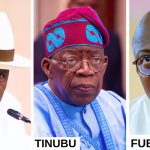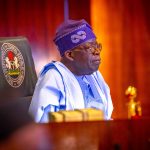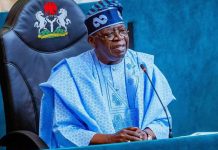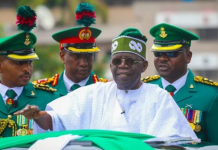The railway used to be a very important part of transportation in Nigeria during the colonial era up until the collapse of everything that once worked in this country. The collapse began, suspect, with the civil war and its aftermath and the introduction of a Structural Adjustment Programme (SAP) in the 80s which turned the country into a waste-land of poverty. As young students, knowing the rail lines of Nigeria was a compulsory assignment if you were studying Civics or Geography. I recall how we were made to draw those winding lines with double bars across indicating the lines from Lagos to Nguru and Port Harcourt to Maiduguri. We also memorized all the destinations along the line. We were taught that the first railway in Nigeria was opened between Lagos and Abeokuta in 1898 by the colonial authorities using the Cape gauge, a very narrow gauge.
In Abeokuta, Ibadan, Kano, Maiduguri, the train terminal was a major cultural and social icon, a bustling centre of economic activity. Along the route to the major terminals, small communities developed along the rail routes, the trains linked towns and communities – Ifo, Ilaro, Mokoloki, Minna, Kaduna, Kaura Namoda, Kuru, Jos and the people in such places found jobs and opportunities. During the civil war, the rail line was a ready route of escape from the pogrom in parts of the country as Easterners fled to their ancestral homeland. After the war, the railway was also useful. It provided not just a reliable alternative to road travel, it was also useful for the transportation of goods and services. As a young lad, I travelled with my step mum from Abeokuta to Ibadan and to Lagos. At every major train station, hordes of sellers would knock on the windows and sell sugar cane, bean cake, maize, corn matte, and all kinds of fried materials. The signal that the disembarkation of passengers and the boarding of new ones had been completed was always signaled by the loud horn of the train and the clanging of bells to announce the continuation of the journey. I found the movement of the train especially intriguing. I preferred to look out of the windows to soak in the sight of moving houses and trees. In my innocent mind, I thought the houses and trees moved along with the train.
The Nigeria Railway Corporation (NRC) was one of Nigeria’s biggest public sector employers at the time. We used to hear of such things as Railway Yard, and truly, it was quite prestigious to be a Railway Staff. In Dugbe, Ibadan, Lafenwa in Abeokuta, Iddo in Lagos, Kafanchan, Jebba, Minna, the Railway station was a 24-hour melting pot of culture, commerce and engineering. The NRC could also boast of many rich assets. The trains were so slow it usually took about three days to get to Kano from Abeokuta. But the people were happy with the services. The routes were safe, day and night. There were no regular accidents, and if any, very minor, but the most fatal that occurred was at Langa-Langa in present day Nasarawa State on February 16, 1970. The train was on its way to the South East from Jos, when it suddenly derailed at Langa-Langa, resulting in the death of about 150 persons. It was a tragic accident. Many had to be amputated before they could be rescued from the wreckage. But this did not deter people from patronizing the services of the Nigeria Railway Corporation (NRC). In due course, Nigeria happened to the Railway. Hereis what that means: the Nigeria Railway became inefficient. Its coaches collapsed one after the other and they were not replaced. Many of the train stations from Lagos to Nguru, from Port Harcourt to Maiduguri were abandoned.
Many of the train communities lost the commerce that the trains brought along. In the few places like Lagos, where a few coaches still moved between Agege and Iddo, rail transportation had become an expression of madness. By 1990, the NRC could only boast of about 15 coaches in its entire national network. In many parts of the country, vandals stole the iron on train tracks and melted them for their own selfish purposes. The tracks were already overgrown with weeds in any case. The most shocking illustration of the failure of the NRC was the conversion of the rail lines into trading posts. In Lagos, at Agege, and in Yaba, Oshodi, and Mushin, as the rickety surviving coaches approached, the traders moved their wares out of the way. As soon as the train passed, they would set up their wares again: tomatoes, pepper, second hand clothes, chin chin, puff puff. Late in the night, the rail tracks were turned into public toilets! The dispossession of the Nigerian economy due to bad economic judgment, bad leadership and corruption within the public sector led to the collapse of the Nigerian Railway: unpaid salaries and allowances, un happy pensioners, abandoned yards. As the railways collapsed, Nigerians moved to the roads. The roads would also soon collapse under the weight of abuse. Air travel has always been elitist. The majority of the people travel on the roads and by rail. In the 80s, the Lateef Jakande administration in Lagos, thinking ahead, tried to build a Metroline in Lagos. Jakande meant well, but the Buhari administration that came to power in 1985, aborted the project. About 40 years later, Lagos is still struggling to revive the dream.
Indeed, it has been long recognized that a multi-modal transportation system and a railway system in particular was crucial to Nigeria’s development process. This explains why since the return to democratic rule under the leadership of President Olusegun Obasanjo, concerted efforts have been made to strengthen transportation infrastructure in the country with the rail system as part of the design. Other administrations have followed suit with efforts and programmes to deliver efficient and solid railway infrastructure.
In 2006, the China Civil Engineering Construction Corporation (CCECC) was brought in to build the Lagos-Kano Standard Gauge Railway. Before the Obasanjo Government left office in 2007, there had been an attempt to further expand railway operations in the country. In 2009, serious attempts began to restore the rail lines beginning with the Port Harcourt to Maiduguri, on the Eastern line. At both state and Federal levels, efforts were also made to re-build Nigeria’s railway infrastructure. In fairness to the Buhari administration which assumed office in 2015, it has done a lot to sustain infrastructure projects that it inherited from its predecessors, including the Jonathan administration, the railway, included. These include the Abuja-Kaduna rail line of 187 km, officially commissioned on July 26, 2016, the Warri-Itakpe line completed in 2020. It took 30 years to finish that particular construction. The Lagos-Ibadan line was launched on June 10, 2021. The administration has also constructed major railway terminals in Lagos, Ibadan, Abeokuta and parts of the East. In a sense, what the Buhari administration has done with the Railways, in terms of structure, branding, reinvention, and promotion of communal ownership is meant to be one of its major legacies.
Unfortunately, all of that is coming unstuck in a very bad manner. The rail lines cited above and others are in place, and others are works in progress, but the efforts of the Buhari administration in taking the revival of the rail infrastructure in the country to a strong end is undermined by recent revelations and incidents about the integrity of railway operations in the country. The most shocking development would be the attack on an Abuja-Kaduna bound train by terrorists last Monday. As reported, 398 passengers bought tickets, 362 boarded, but some media outlets reported that a total of 970 persons were on board. How? Nigeria is one country where basic statistics is a ghost affair, we are a country where nobody knows how much crude oil is produced, how much is refined or imported, how many students are in school or out of school, how many policemen the country has, there is even no reliable data on retail sales, we don’t even know the country’s exact population! Almost a week after the attack on the night train to Kaduna, Nigeria remains in a state of confusion. The only people that are most affected are those who lost their beloved ones- their only sin is that they belong to a country that does not care enough for its citizens. The Abuja-Kaduna train tragedy speaks to all that is wrong with Nigeria: we have revived the railways, but in the very effort that has been made is the seed of failure. Who is going to explain this failure to the affected families? Who is going to tell them that it is okay to die needlessly in Nigeria? The big lesson from the Kaduna-Abuja train tragedy is that the country is not safe. Not even in the Langalanga incident was there a report of bombing. The rail tracks at the worst of times in the past used to be safe. Today, terrorists plant bombs either in trains or on rail tracks.
I painted the picture of a time when the Railway was considered one of the safest modes of transportation in Nigeria and the decline that followed. Despite all the investments and the attempts to revive the railway sector, it is sad to note that the best is not working. A loud statement was made about the insecurity in the land when the Abuja-Kaduna train was bombed. There have been other cases of train bombing in the world: the Minsk Metro bombing of 2011, the Chennai train bombing of May 2014, the Istanbul Metro bombing of 2015, the Brussels train bombing of March 2016, the Saint Petersburg Metro bombing of April 2017, all of them linked to terrorist attacks. What rankles in the Nigerian case is that there was prior intelligence. Nobody acted on the intelligence. Both the governor of Kaduna State, Nasir el-Rufai and the minister of Transportation have disclosed that the tragedy was avoidable, because it was foreseen.
El-Rufai accuses the military of failing to do its duty by blatantly refusing to attack their hideouts of the terrorist despite having enough information about their location, identity and operations. El-Rufai barely stopped short of accusing the military of complicity. He plans to see the President to make specific requests: he says military formations should be established in the North West, that the military should show greater determination, and that the NRC should stop night operations henceforth. The Minister of Transportation says the problem is money: if only he had been given N3bilion as earlier proposed to address security and surveillance issues and to purchase sensors and other surveillance equipment, nobody would have been able to go near the trains to plant bombs or attack travellers. The Inspector General of Police now says he has deployed security men to protect the engineers who have been directed to make sure the trains start working again forthwith. He also wants to deploy drones. The Nigerian Air Force says it will use aircraft to provide back up security for trains in Nigeria. Minister Rotimi Amaechi has talked about engaging villagers along train routes to provide information to the security agencies.
Please where on earth does anyone build strategic railway lines across vast, ungoverned spaces of the country without working out a security arrangement, only to wait for tragedy to occur before considering security as an add-on? Only in Nigeria! We act first and think later, after a familiar fashion. The terrorists in the North West and the North East have become more audacious because they know that Nigeria is negligent. They understand the weakness of the state better than the state itself. One whole week after the incident, with the President giving the Service Chiefs marching orders, nobody has been arrested, nobody has given us any positive information, no victim has been rescued! But we have evidence of cosmetic visits to the hospitals and promises made. The House of Representatives acting patriotic asked the Service Chiefs and other stakeholders to show up in their Chambers to give account. The Service Chiefs and other stakeholders, with the exception of the DG of the Nigeria Airspace Management Authority (NAMA) sent Representatives! The President has directed that services should resume. The Nigeria Railway Workers Union has sent back a rebuttal: its members are not going back to work unless their safety can be guaranteed. I doubt if many passengers would have the courage to travel by rail again, either along the Abuja-Kaduna route or elsewhere. The problem is that the roads are not safe, air travel is expensive, and there are no other ready options. We are under the siege of bandits and terrorists and hapless security agents. Apart from the bombing of the Abuja-Kaduna train, the Kaduna International Airport was also attacked by terrorists who according to a certain Army General were just passing by. Passing by! Communities have also been tacked in Niger State, close to the Federal Capital Territory.
Governor el-Rufai says if the Federal Government would not do anything, he will arrange to get mercenaries to fight the terrorists. He is speaking out of frustration. He has no such powers under the 1999 Constitution of the Federal Republic. The Nigeria Air Force says they are now prepared to deploy the Super Tucano jets which Nigeria bought from the US in 2021. When we see the jets in action, we will say so – seeing is believing as Nigerians would say. But all of this is reactive rather than pro-active. Insecurity remains the biggest problem Nigeria faces today. It is the same problem that any Presidential aspirant in the 2023 Presidential election must talk about with clarity and sense. On this subject, the outgoing administration must eschew the temptation to abuse, harass, insult or intimidate anyone who chooses to speak truth to power either from the pulpit or from lecture halls at home and abroad, whether that person be a Sheik, an Overseer or a former President. We need to make the trains safe: leverage technology, put the best hands in charge and place a higher priority on the observance of best practices. In 2019, the Nigerian government reportedly reviewed the National Security Strategy (NSS) to find lasting solutions to security threats. It was the first time since 2014 that such a review would take place. Three years later, where are the gains of that review?












